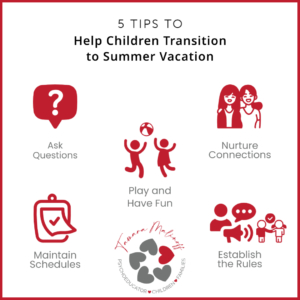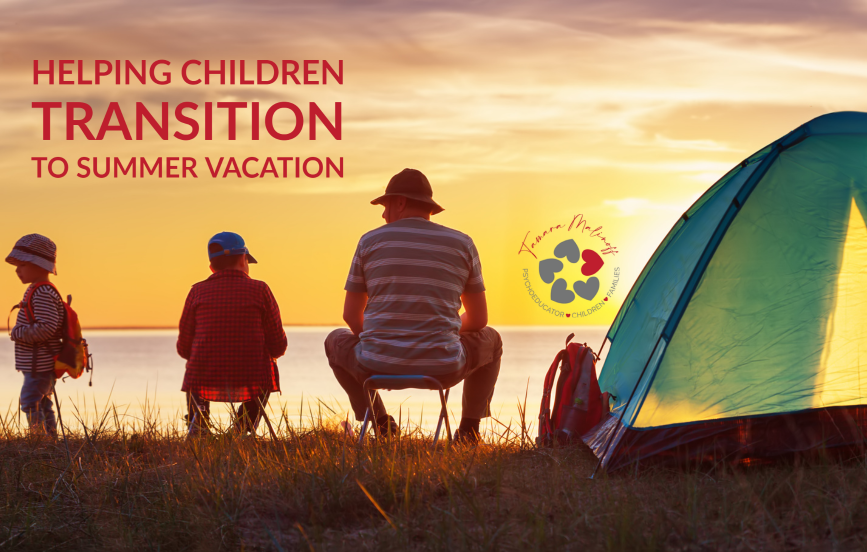As the school year comes to an end, many are looking forward to their favorite familiar places like summer camps (day or sleepaway), and family vacations. While it is an exciting time, it is also a time of transition. Transitions can be challenging for both children and parents.
Some parents may ease into the relaxed routine of not having to prepare lunches and rush out in the morning, or finally booking that vacation abroad; while others might be stressed trying to find activities or camps to provide a balanced summer of fun activities, they hope their children will enjoy.
For some children, it is a welcomed break and for others, it can cause mixed emotions; increased stress, especially for children who are less adaptable to change.
Here are 5 tips to help children transition to summer vacation:

Ask questions to prepare for the transition: Not all children are excited that the school year is over. Some may feel sad because they will miss their friends and teachers. By asking questions, we can validate their emotions. Ask: “What do you think you will miss the most now that the school year is over?” or “Who will you miss the most?”. By allowing children to share their feelings will help them process the transition.
Nurture connections: Try organizing a playdate with good friends within a week or two after school ends. This will help children nurture their connections outside from school. It can also reduce the stress of interrupting their relationships during the break. If your child is missing a teacher or friend that they will not see until the new school year, encourage them to write a letter or draw a picture, then mail or email it to the person.
Maintain schedules: Children thrive on routines and structure. They may not tell us, but the predictability of what comes next helps them feel safe. This does not mean we have to be rigid. We can allow for later nights to celebrate and watch the fireworks; or sit around the firepit at night and roast some marshmallows. Children will do much better if we keep to the same routines, such as sleep and meals. Stick with reasonable bedtimes and support healthy sleep habits. Invest in some blackout blinds/curtains to help them fall asleep when it is still light out at bedtime and the early sunrises.
Establish the rules: We first need to be clear about what our rules and boundaries are before presenting them so that children can be successful. So, if your rule is no screen time before chores and/or physical activities or how far they can bike from home, it needs to be clear and shared in advance. We need to establish the rules ahead of time and hold the boundary with appropriate consequences. Have simple rules that are easy to follow.
Play and have fun: Children learn through play. Lack of play is a health issue and the American Academy of Pediatrics has recommended that pediatricians prescribe play for all children. Through play, children develop a variety of skill sets to optimize their development and help to manage stress. Developmentally appropriate play with parents, caregivers and peers promotes the social-emotional, cognitive, language, and self-regulation skills that build executive function, a prosocial brain and positive behavior. Additionally, play supports the development of nurturing, safe, and stable relationships with caregivers that children need to thrive. So, no matter your plans this summer, try having fun and enjoy the precious moments together.




